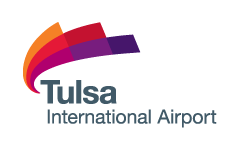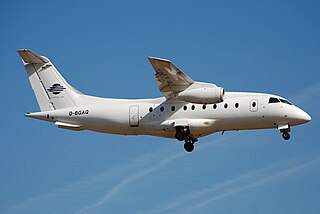| |||||||
| Founded | 2001 | ||||||
|---|---|---|---|---|---|---|---|
| Ceased operations | 2004 | ||||||
| Hubs |
| ||||||
| Fleet size | 5 | ||||||
| Destinations | 11 | ||||||
| Headquarters | Tulsa, Oklahoma, United States | ||||||
| Key people |
| ||||||

Great Plains Airlines was a regional airline headquartered in Tulsa, Oklahoma. [1]
| |||||||
| Founded | 2001 | ||||||
|---|---|---|---|---|---|---|---|
| Ceased operations | 2004 | ||||||
| Hubs |
| ||||||
| Fleet size | 5 | ||||||
| Destinations | 11 | ||||||
| Headquarters | Tulsa, Oklahoma, United States | ||||||
| Key people |
| ||||||

Great Plains Airlines was a regional airline headquartered in Tulsa, Oklahoma. [1]
The airline was founded by Jack Knight and Jim Swartz to give Oklahoma City and Tulsa travelers affordable quality non-stop service to a number of destinations, ultimately with direct flights to heavily traveled business destinations on the east and west coasts. [2] [1] The airline was founded in 2001 with a mix of tax credits and government loans totaling $27 million [3] and expanded rapidly, filing with the Air Transportation Stabilization Board for a guarantee of $17 million from a $25 million loan, though this was rejected, as the Board deemed the airline's business plan to be too risky. [1]
To assist in starting the airline, an air operator's certificate was purchased from Ozark Airlines, an airline not related to the original Ozark Airlines, but a small regional airline operating Dornier 328JETs. The airline also took over operation of Ozark's two aircraft, [4] and later expanded the fleet to five aircraft including a Dornier 328 turboprop by the time of the airline's closure. [3]
In 2002 Great Plains joined with commuter airline Rio Grande Air to provide a feeder network from Albuquerque to the smaller New Mexico cities of Alamogordo and Taos as well as to Durango, Colorado. Rio Grande Air adopted Great Plains "ZO" code on their flights.
The airline filed for bankruptcy and ceased operations in 2004 after attempts to secure additional financing and investments were unsuccessful. [3] After it ceased operations, all five of the company's aircraft were repossessed by creditors and all other property belonging to the airline was auctioned off. [3] The airline also sold its tax credits to a third party for $15 million, but was ultimately unable to repay $7.1 million of a December 2000 loan arranged by local government agencies, triggering a lengthy dispute between the Tulsa Airport Improvement Trust (TAIT), the Tulsa Industrial Authority (TIA), the Bank of Oklahoma and the city of Tulsa. TAIT had guaranteed the loan by agreeing to buy the mortgaged Air Force Plant No. 3 adjacent to Tulsa International Airport from the TIA if the airline defaulted, but this agreement was deemed to violate Federal Aviation Administration policies prohibiting an airport authority from subsidizing a particular airline, and TAIT was sued by the TIA after declining to buy the plant for this reason. After a 2011 settlement attempt using city of Tulsa funds was rejected as illegal by the Oklahoma Supreme Court, the dispute was finally settled in August 2015 for $1.69 million. [2]
The airline had several signature items, including Krispy Kreme donuts and Arby's sandwiches served on board. [5]

Tulsa International Airport is a civil-military airport five miles (8 km) northeast of Downtown Tulsa, in Tulsa County, Oklahoma, United States. It was named Tulsa Municipal Airport when the city acquired it in 1929; it received its present name in 1963. While Tulsa International Airport only serves domestic destinations, it is still an international airport since it has customs and border patrol facilities.

Air Midwest, Inc., was a Federal Aviation Administration Part 121 certificated air carrier that operated under air carrier certificate number AMWA510A issued on May 15, 1965. It was headquartered in Wichita, Kansas, United States, and from 1991 was a subsidiary of Mesa Air Group. Besides initially flying as an independent air carrier, it later operated code sharing feeder flights on behalf of Eastern Air Lines as Eastern Air Midwest Express, on behalf of American Airlines as American Eagle, on behalf of Trans World Airlines (TWA) as Trans World Express and on behalf of US Airways as US Airways Express. It also operated feeder flights on behalf of Braniff (1983–1990) and Ozark Air Lines in addition to flying for Mesa Airlines. Air Midwest was shut down by its parent company, Mesa Airlines, in June 2008.

Telluride Regional Airport is a public airport six miles west of Telluride, in San Miguel County, Colorado, United States. It is owned by the Telluride Regional Airport Authority. At an elevation of 9,078 feet above sea level, it was the highest commercial airport in North America with scheduled passenger flights when Great Lakes Airlines resumed scheduled passenger service in December 2016; however, those flights ceased in March 2018. In August 2018, commercial service returned with the introduction of Boutique Air, and the airport remains the highest airfield in the U.S. with scheduled passenger flights, and the second highest overall airfield in the US behind Leadville Airport. Denver Air Connection is currently the only airline flying scheduled passenger flights from Telluride with daily nonstop flights to Denver and Phoenix. Denver Air operates the Fairchild-Dornier 328JET into Telluride. The 328JET is one of the few regional jet airliners in service capable of operating at such high field elevations as TEX.
Trans States Airlines was a regional airline in the United States that operated from 1982 until 2020, when it shut down due to the COVID-19 pandemic. It was owned by Trans States Holdings and headquartered in Bridgeton, Missouri. At the time of its closing, the airline operated flights for United Airlines under the United Express brand. Trans States Airlines ceased all operations on April 1, 2020.

Western Pacific Airlines, or WestPac, was an airline which operated in the United States from 1995 to 1998. A low-cost carrier, it was formed in 1994 under the name Commercial Air, later changed to Western Pacific, and began operating scheduled passenger flights on April 28, 1995, with eight Boeing 737-300s. Edward Gaylord of Gaylord Entertainment Company was involved in the formation and management of the airline. Its headquarters were in unincorporated El Paso County, Colorado, near Colorado Springs.
Ozark Air Lines was a local service carrier in the United States that operated from 1950 until 1986, when it was purchased by Trans World Airlines (TWA). Ozark got a second chance to be an airline when the carrier that won the routes for which Ozark applied, Parks Air Lines, failed to start them in a timely manner. Parks had its rights revoked, Ozark won not only the routes it previously applied for, but others as well. Parks merged into Ozark and Ozark took over the Parks operation and the single route over which Parks had recently started service, thereby launching Ozark. Ozark over time became a jet carrier with a hub in St. Louis.

Durango–La Plata County Airport is a city- and county-owned public airport 12 miles southeast of Durango, in La Plata County, Colorado.

Pueblo Memorial Airport is a public airport located six miles east of Pueblo, in Pueblo County, Colorado, United States. It is primarily used for general aviation.

Fort Smith Regional Airport is a public use airport located near the Interstate 540 freeway three nautical miles (6 km) southeast of the central business district of Fort Smith, in Sebastian County, Arkansas, United States. FSM is governed by the Fort Smith Airport Commission as established by the City of Fort Smith, Arkansas. It serves the transportation needs of residents and businesses of western Arkansas and eastern Oklahoma. FSM is currently served by American Eagle, the regional airline affiliate of American Airlines. It has a large population of corporate and general aviation aircraft. A full-service fixed-base operator (FBO), Signature Flight Support, provides service to general aviation, airline, and military operators.

Alamogordo–White Sands Regional Airport is a city-owned public-use airport located four nautical miles southwest of the central business district of Alamogordo, a city in Otero County, New Mexico. It opened in 1959 and was formerly known as Alamogordo Municipal Airport. The airport was the home for Black Hills Aviation, with a fleet of fire fighting aircraft. The company was bought out by Neptune Aviation in 1993 and moved to Missoula, Montana. Neptune still bases some of its current fleet of British Aerospace 146 jets at Alamogordo during active forest fire seasons. The airport also sees large MD-87 firefighting jets operated by Erickson Aero Tanker.

Central Airlines was a local service carrier, a scheduled passenger airline operating in Arkansas, Colorado, Kansas, Missouri, Oklahoma, and Texas from 1949 to 1967. It was founded by Keith Kahle in 1944 to operate charter and fixed base services in Oklahoma, but was not granted an air operator's certificate until 1946 and did not begin scheduled flights until September 15, 1949, just before the certificate expired. Central was then headquartered at Meacham Field in Fort Worth, Texas. The airline was eventually acquired by and merged into the original Frontier Airlines which continued and expanded its network.

The Fairchild-Dornier 328JET is a commuter airliner, based upon the turboprop-powered Dornier 328, developed by the German aircraft manufacturer Dornier Luftfahrt GmbH. It would be the last Dornier-designed aircraft to reach production before the company's collapse during the early 2000s.
Taos Regional Airport is a public use airport eight nautical miles (15 km) northwest of the central business district of Taos, in Taos County, New Mexico, United States. It is owned by the Town of Taos. FAA's National Plan of Integrated Airport Systems for 2009–2013 classifies it as a general aviation airport.
Frontier Airlines was a United States local service carrier, a scheduled airline that was formed by the merger of Arizona Airways, Challenger Airlines, and Monarch Air Lines on June 1, 1950. Headquartered at the now-closed Stapleton International Airport in Denver, Colorado, the airline ceased operations on August 24, 1986. A new airline using the same name was founded eight years later in 1994.
Aspen Airways was an airline carrier and regional affiliate of United Express and based in Hangar 5 in Stapleton International Airport in Denver, Colorado. Aspen ceased operations on April 1, 1990, when separate portions of the airline were acquired by Mesa Airlines and Air Wisconsin Services, Inc.

Lynx Aviation, Inc. was a regional airline based in Denver, Colorado, United States. The airline began as a sister company to, and operated feeder service for, Frontier Airlines. The Lynx name played off of the tail pictures of its planes, specifically Larry the Lynx, and the fact that it "linked" smaller airports to the main Denver hub of Frontier Airlines. All flights operated by Lynx Aviation were sold and marketed as "Frontier Airlines operated by Lynx Aviation."
Lone Star Airlines was an American regional airline that operated both domestic and international flights. For much of the airline's life its headquarters were located in the Fort Worth Stockyards in Fort Worth, Texas. The airline's largest hub was located at Dallas/Fort Worth International Airport. The airline filed for bankruptcy in August, 1998 and was liquidated in October, 1998.

Mountain Air Express (MAX) was a short-lived commuter airline in the United States founded in 1996. The air carrier was established by Western Pacific Airlines in order to provide passenger feed.

Trans-Colorado Airlines was a United States airline based in Colorado Springs, Colorado. It operated from August 1980 until July 1988. The airline operated flights for Continental Airlines under the Continental Express banner beginning in 1986.
Taos Air was an American virtual airline that operated seasonal scheduled public air charter service between Taos Regional Airport in Taos, New Mexico, and several airports in California and Texas. The airline was owned by Taos Ski Valley, Inc. Service to Texas began in the 2018–2019 winter season while the 2019–2020 winter season saw the introduction of California routes. The carrier operated Fairchild Dornier 328JETs with its own livery from 2018 through summer 2022, then switched to Embraer 135 regional jets operated by JSX beginning with the 2022–2023 winter ski season. Taos Air effectively ceased operations permanently in April 2024.